Delta Force Competitive Potential: Ultimate Guide to Ranking & Rewards
Updated On: November 12, 2025 by Aaron Connolly
Delta Force Competitive Potential Overview

Delta Force really stands out from the usual ranked shooters. It takes a different route with competitive gaming, throwing both Operations and Warfare modes into the mix. Instead of just rewarding lone-wolf fraggers, it genuinely values teamwork.
The game’s cross-platform integration and deep strategy layer? That’s what gives its competitive scene real staying power.
Importance of Competition in Delta Force
Competition drives Delta Force’s player base to stick around. The game splits its competitive side into two modes, each pushing players in their own way.
Operations mode keeps things tense. Teams only get one respawn, so every move feels risky.
Warfare mode feels more familiar if you’re used to classic shooters. Longer firefights, more focus on controlling the map.
You’ll climb the ranks by earning Merit Points. That gives you something to chase and keeps you coming back.
Key competitive features include:
- Cross-platform play on all sorts of devices.
- Integrated ranking for both main modes.
- Regular seasonal events and updates.
- Team-oriented mechanics that reward good coordination.
Differences from Other Ranked Shooters
Delta Force ditches the typical “solo carry” mentality you see in most ranked shooters. Those games usually push you to focus on your own stats above all else.
Traditional ranked modes tend to have:
- Solo queue focus
- Metrics based on individual stats
- Stressful elimination systems
- Not many respawns
Delta Force’s approach? It’s all about:
- Squads and tactical teamwork
- Rewarding coordination
- Positioning and planning, not just fast reflexes
- Multiple ways to compete
Strategic play and communication matter more than raw aim. You won’t climb just by racking up kills.
Different player types get to shine. Support players, tacticians, and top fraggers can all contribute in their own way.
Appeal to Competitive Players
Delta Force really appeals to competitive gamers who love depth and team play. If you’re into map strategy and comms, you’ll find plenty to dig into.
The competitive scene gets a boost from:
- Frequent updates and balance tweaks
- Clear progression in both main modes
- Rewards that shout out team achievements
- A growing player base—175,000+ and counting
Cross-platform play means a bigger pool of competitors. You’ll get better matchmaking and less waiting.
The game lets you pick your competitive path. Some players thrive in the tactical, high-stakes Operations mode. Others stick to the fast-paced Warfare battles.
Quick win: Try Warfare first to get your bearings. Operations is a bit more punishing if you’re used to respawns.
Heads up: Operations mode’s one-life rule can really frustrate players who want more chances per match.
Unlocking Ranked Mode in Delta Force
Jumping into ranked mode isn’t complicated, but you’ll need to hit certain milestones first. Once you know where to look for the rank battle button and what you need to qualify, you’re set.
Requirements to Access Ranked Mode
You have to reach account level 15 before ranked mode unlocks. This makes sure you’ve got the basics down before you start competing.
You’ll also need to finish the tutorial missions. These run you through weapon use and map movement.
Quick win: Grind Operations and Warfare to level up faster. Those modes pay out the most XP per match.
Your account needs to be clean—no recent bans or penalties. If you’ve got a temporary restriction, you’ll have to wait it out before you can jump into ranked.
A stable internet connection is a must. The game checks your connection before letting you in, so you don’t end up dropping out and hurting your team.
Account Level and Rank Level
Account level and rank level work separately. Your account level shows your overall experience, while rank level reflects your competitive skill.
You’ll raise your account level by playing any mode—matches, challenges, daily missions, all of it.
Your rank level only goes up (or down) in ranked matches. Merit Points track your progress there.
| Level Type | How to Increase | What It Affects |
|---|---|---|
| Account Level | Any game mode | Unlocks features |
| Rank Level | Ranked matches only | Competitive standing |
Heads up: Rank level resets every season, but your account level sticks around. Time your competitive push with the season schedule.
Both levels show up in your profile. Take a look before you start your ranked grind so you know where you stand.
How to Use the Rank Battle Button
Once you’ve unlocked ranked mode, the rank battle button shows up on your main menu. You’ll find it right next to the standard matchmaking.
Clicking it brings up the ranked options. Delta Force lets you play ranked in both Operations and Warfare.
Pick the mode you want before queuing up. Each mode tracks your rank separately, with its own Merit Points.
The button displays your current rank and Merit score. You can also check what you need for the next rank and see what seasonal rewards are on offer.
Quick win: Queue during busy times—usually evenings and weekends—for faster matches. Sometimes, longer waits mean fairer games, but it’s a toss-up.
The system matches you with players at your skill level. If you don’t accept a match when it pops, you’ll get a cooldown.
How Delta Force Ranked Mode Works
Delta Force uses a hybrid ranking system. You’ll earn Merit Points for your performance in both Warfare and Operations, and you don’t have to mess with separate queues—just tick a box in the menu.
Skill-Based Matchmaking Explained
Delta Force skips the separate ranked lobbies that most shooters use. Instead, it matches you with players at your skill level through the regular SBMM system.
You’ll face similar opponents whether you have ranked mode on or not.
The real difference is Merit Point tracking. With ranked mode active, your performance gets scored and you earn points based on what you do in the match.
Merit Points take the place of old-school rank ladders. How well you play—not just wins or losses—determines your progress.
The game checks your Score Per Minute (SPM) in Warfare mode and your extraction value in Operations. The better you play, the more points you rack up.
This setup lets casual and hardcore players mix in the same lobbies, but still gives competitive folks a reason to grind.
Role of Operations and Warfare Modes
Both Operations and Warfare add to your ranked progress, but each has its own scoring.
Warfare mode gives you Merit Points for:
- Enemy kills
- Revives
- Capturing points
- Support plays
Operations mode scores you for:
- Loot extracted
- Eliminating NPCs and enemy players
- Completing contracts
- Delivering Mandel Bricks
Support players can climb in Warfare by healing, resupplying, and reviving. Operations is more about juggling PvE and PvP.
Quick tip: Use Merit Cards from events or the Battle Pass to double your points for a while. Don’t forget to activate them before you queue.
You can bounce between modes, and both count toward your overall rank.
Activating Ranked Mode in the Main Menu
You’ll unlock ranked mode at account level 6. The game lets you know when you’ve hit that milestone.
Look for the “Rank Battle” checkbox in the main menu before you start a match. Ticking it turns on Merit Point tracking.
The checkbox stays on until you turn it off. No need to keep re-enabling it for every game.
After a match, you’ll see how many Merit Points you gained or lost. The game spells out your progress toward the next rank.
Your current rank and Merit Points show up in the main menu. It’s easy to check how close you are to ranking up.
Keep an eye on your rank progress. There are 25 tiers, from Private III up to General of the Army, and each one needs a certain number of Merit Points.
Ranking System and Progression
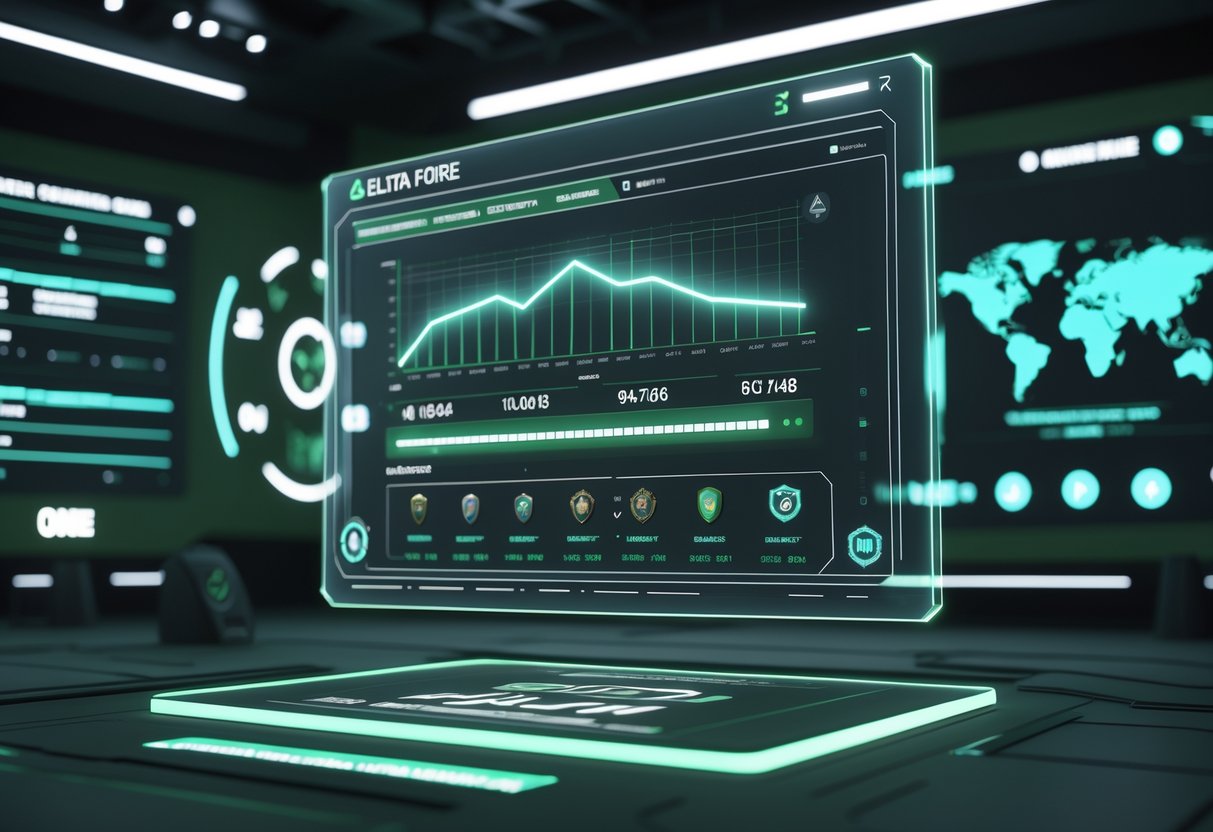
Delta Force mixes individual performance with steady progress, making it less intimidating than some hardcore FPS games. There are multiple rank tiers, and seasonal resets keep things interesting.
Delta Force Rank Tiers
The ranking system has several tiers. You’ll climb through them by playing ranked matches and performing well.
Ranks follow a military theme. Everyone starts at the bottom and works upward by earning Merit Points.
Key rank features:
- Multiple tiers, each with subdivisions
- Rank badges you can show off in-game
- Exclusive rewards at higher ranks
- Matchmaking based on rank for fairer games
If you reach General of the Army, you’ve hit the top. That takes skill and dedication.
Each tier has a specific Merit Point requirement. You’ll need to win and play well to move up.
Rank Progression Mechanics
Merit Points are your ticket to higher ranks. You’ll get them by winning, playing well, and helping your team.
You can earn Merit Points for:
- Winning matches (that’s the big one)
- Personal stats and performance
- Completing objectives
- Team support actions
The system looks at both wins and how you play. Even if you lose, good individual play helps you progress.
Ranking factors include:
- Kill/death ratio
- Playing the objective
- Supporting your squad
- Finishing matches
Losses don’t hurt as much as in some games. You lose fewer points, so the grind isn’t quite as punishing.
Ranked mode matches you with others at your skill level. Your current rank and recent games factor into matchmaking.
Rank Resets and Seasonal Progression
Delta Force resets ranks every season to keep things fair and fresh. Resets usually line up with big updates.
During a reset, you won’t lose everything. The game does a soft reset—you keep some progress, but there’s room for movement up or down.
Seasonal reset features:
- Your rank drops, but not all the way to the bottom
- Placement matches decide your new starting spot
- Seasonal rewards depend on your peak rank
- Merit Point requirements update
If you finished last season at a high rank, you’ll start the next one higher. That rewards players who stay consistent.
Quick win: Finish your placement matches early in the season. You’ll lock in your rank and avoid the late-season rush.
Seasonal rewards include cosmetics, weapon skins, and other cool stuff. Once you earn them, they’re yours for good.
Earning Merit Points and SPM
Merit Points drive Delta Force’s ranking system. Your Score Per Minute (SPM) decides how fast you climb.
If you want to rank up, focus on the actions that give the most Merit Points and tweak your playstyle to keep earning steady gains in both game modes.
Score Per Minute Strategies
SPM calculations really change between Delta Force’s two main competitive modes. In Warfare, we rack up merit from a variety of actions—it’s definitely not just about getting kills.
If you focus on objectives, you’ll see the biggest SPM gains. Capturing flags, holding control points, and keeping map control all add up to steady merit every match.
Players who chase objectives often end up ahead of pure fraggers. It’s kind of surprising, isn’t it?
Blowing up vehicles gives you a huge SPM boost. Engineers with AT4 rockets or C4 can rack up a ton of merit by taking out tanks and IFVs.
Taking out just one vehicle sometimes matches the merit from several player kills.
Support actions keep the points flowing too. Healing, dropping ammo, and reviving squadmates all build up your SPM.
Some top players barely get any eliminations but still climb the leaderboards thanks to their support play.
Operations mode flips the script. Here, you earn merit by eliminating NPCs, finishing contracts, and extracting with high-value loot.
Delivering Mandel Bricks for the first time gives especially big rewards.
Best Ways to Accumulate Merit
You’ll need a plan to rack up merit efficiently. Just playing randomly won’t cut it.
Try to use 2x Merit Cards during your best performance streaks to really cash in on strong matches.
Consistency beats the occasional lucky game. Stick to merit-generating actions that match your skill level instead of gambling on risky high-kill plays.
Working with your team makes a huge difference. Move with your squad, use pings, and back up their pushes.
Even random squads can do a lot better with just a little communication.
The mode you pick matters. Warfare usually gives more steady merit through objectives and support.
Operations can pay out more, but only if you make it out with the loot.
Timing is everything. Use merit cards during weekend events or when you’re really on your game to get the most from multipliers.
Impact of Gameplay Roles on Merit
Different roles let you earn merit in different ways. There’s room for all playstyles if you lean into your strengths.
Support players often top the merit charts without being aggressive. Medics, engineers, and logistics specialists rack up SPM with heals, repairs, and ammo drops.
Assault players get merit mostly from kills and objectives. But steady, reliable play tends to pay off more than wild kill streaks.
Objective specialists keep their merit rates high by focusing on flag caps and strong defensive spots.
These players know the maps and always seem to be in the right place at the right time.
Vehicle operators can pull in huge merit by positioning well and choosing targets carefully. Good vehicle play helps the team and builds personal SPM fast.
Being flexible with your role usually works best. Adjust your approach to fit your team and the match flow.
That way, you keep earning merit no matter what’s happening.
Key Strategies for Climbing the Ranks
If you want to climb the ranked ladder in Delta Force, you’ve got to maximize Merit Points with smart choices and good timing.
The top players focus on boosting their SPM and using merit multipliers when it counts.
Efficient Use of 2x Merit Cards
2x merit cards are your ticket to fast rank gains. Don’t just burn them at random—save them for sessions when you’re locked in.
Activate your cards when you’re feeling sharp. If you’re tired or frustrated, you’ll just waste the double points.
Best times to use your cards:
- When you’re on a win streak
- During busy hours with active teammates
- Before jumping into your favorite modes
Don’t use cards while testing new gear or learning maps. Stick with what you know works.
Timing is critical. Start your card at the beginning of a match, not halfway through.
That way, you get the full benefit right from the first objective or elimination.
A lot of people hoard their cards and end up missing out. Use them regularly, but pick your moments.
If you wait too long, you’ll just miss out on steady rank gains.
Tactics for Operations Mode Success
Operations mode rewards careful play far more than reckless rushing. Teams only get a few respawns, so every move matters.
Focus on objectives instead of chasing kills. Securing extraction points and finishing missions will net you more Merit Points.
Talking with your team wins games. Use voice chat or pings to call out enemies and plan moves together.
Try these tactics:
- Stick with your squad, don’t go lone wolf
- Grab high ground early if you can
- Watch your resources as the round goes on
- Switch up your loadouts to fit each map
Blowing up enemy vehicles can swing a round and give you a huge merit bump. Bring anti-vehicle gear if you know you’ll need it.
Good positioning beats raw firepower here. Learn the maps and watch for common rotations.
Knowing the terrain gives you a real edge over players who just rush in.
Boosting SPM in Warfare Mode
SPM (Score Per Minute) is the main way to climb ranks in Warfare. The faster your SPM, the quicker you rack up Merit Points.
Objectives are everything. Flag caps and point defense bring more merit than just chasing kills.
If you want high SPM:
- Actively capture and defend objectives
- Heal and resupply your teammates
- Focus on holding down areas, not just dueling
- Stay involved from start to finish
Vehicles can really boost your SPM. Learn to drive and fight with them well.
Strong vehicle players almost always end up at the top thanks to their objective support.
Don’t camp in the middle of nowhere. Warfare rewards players who stay near the action and help their team.
Knowing the maps helps you score more. Learn the quickest routes and where enemies usually come from.
If you keep moving efficiently, you’ll find yourself in high-scoring spots more often.
Class Roles and Their Competitive Impact
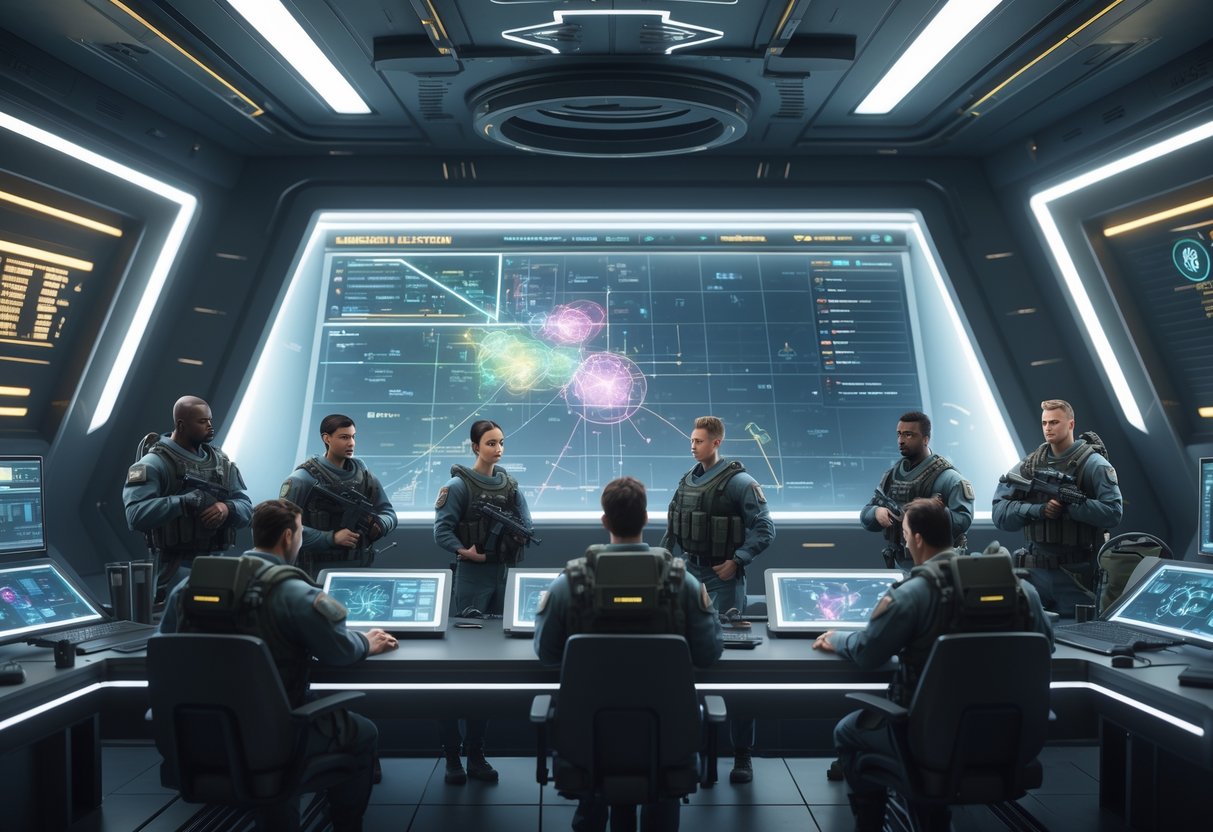
Each operator class brings its own strengths to the table. Support roles keep squads alive during tough pushes, while Engineers handle vehicles that could turn the tide.
Support Classes for Team Success
Support operators like Stinger and Toxic are the backbone of most good teams. They keep everyone fighting longer with heals and buffs.
Stinger acts as a true combat medic. His Hive Tech Pistol fires homing healing darts, so he can patch up teammates without losing focus on threats.
Key Support Abilities:
- Faster revives with more health
- Smokescreen drones to cover rescues
- Healing smoke grenades for safe zones
Toxic supports in a more offensive way. Her Dragonfly Swarm System boosts allies and messes with enemies.
The Adrenaline buff helps weapon handling and cuts down on flinch.
Her Swift Healing trait speeds up health regen for nearby teammates. It’s a nice passive bonus that keeps the squad going.
Most competitive teams run at least one support. The healing and fast revives can decide close fights.
Anti-Vehicle Tactics: Tanks and AT4
Engineers run the show when it comes to vehicle warfare. Tanks and heavy armor can dominate unless someone brings the right gear.
Uluru stands out for long-range vehicle kills. His TV-guided Loitering Munition splits into explosives that can wreck armor from a distance.
Top Anti-Vehicle Tools:
- AT4 rocket launchers for smashing tanks
- Magnetic bombs that stick to vehicles
- Repair tools for keeping your own armor in the fight
Shepard helps defend against vehicles with his Active Defense System, which intercepts incoming explosives.
Taking out tanks takes teamwork. It’s common to see two Engineers focus on anti-vehicle duties on armor-heavy maps.
Timing your vehicle kills can swing the match. Destroying enemy transports during a push can leave them stranded and easy to pick off.
Offensive Versus Defensive Playstyles
Assault operators like D-Wolf go all-in on fast movement and quick kills. His Motorized Exoskeleton lets him sprint and flank at crazy speeds.
Offensive Operator Perks:
- High mobility for map control
- Area damage weapons like grenade launchers
- Fast engagement tools for close-quarters fights
D-Wolf’s tactical slide keeps him moving and dodging during fights. That little burst of speed can catch enemies off guard.
Defensive specialists like Shepard lock down territory. His Sonic Paralysis slows enemy movement and fire in a big area.
Defensive setups are key for objectives. Engineers can block chokepoints with mines and barriers.
Recon operators fill the gap between offense and defense. Luna’s Detection Arrows reveal enemies, making team pushes much safer.
Winning teams balance aggression and defense. You need attackers to push, but defensive operators to hold what you take.
Merit Cards, Bonuses, and Power-Ups
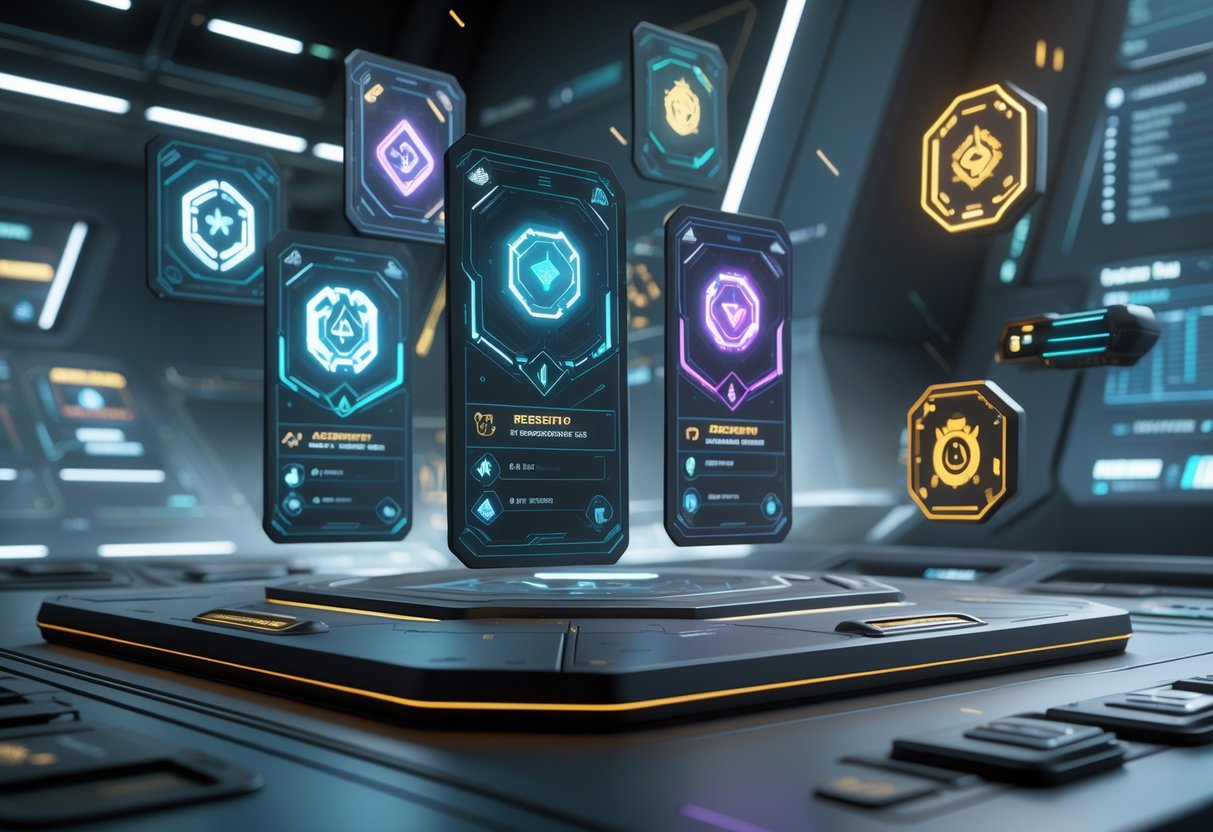
Merit cards speed up your rank progression in Delta Force. Knowing when to use them—and how to stack bonuses—can cut your grind in half.
Types of Merit Cards
You’ll mostly see the 2x Merit Card. It doubles all merit points you earn for a set time.
You can pick up 2x merit cards from the Battle Pass, special events, or seasonal challenges.
Some have time limits—usually 30 minutes or an hour. The timer only ticks down during matches, not when you’re in menus.
Free players get a couple of cards a week from login bonuses. If you buy the Premium Battle Pass, you’ll get more cards each season.
Merit Bonuses and How to Earn Them
Merit bonuses stack with your cards for even faster rank-ups. In Operations mode, extracting with rare loot gives the biggest merit bonuses.
Warfare mode lets you earn steady merit through SPM. Supporting teammates, building defenses, and resupplying all add up.
Sometimes, support actions actually outpace eliminations for merit gains.
Weekly challenges give multipliers for certain tasks. If you complete vehicle destruction or hit kill milestones, you’ll get extra merit on top.
Double merit weekends sometimes pop up during events. If you stack these with your 2x merit card, you can hit 4x merit for a while.
Strategic Timing for Card Usage
Pop your merit cards when you have a long session planned. Quick ten-minute matches just waste the bonus.
Operations mode works best for cards if you’re good at extracting. Failed runs still give some merit, but big wins double your haul.
Use cards during busy hours for faster matchmaking. Sitting in queues just burns your card time.
Save cards for modes you excel at. No point doubling a bad game when you could wait and double a great one.
Ranked Rewards and Seasonal Prizes
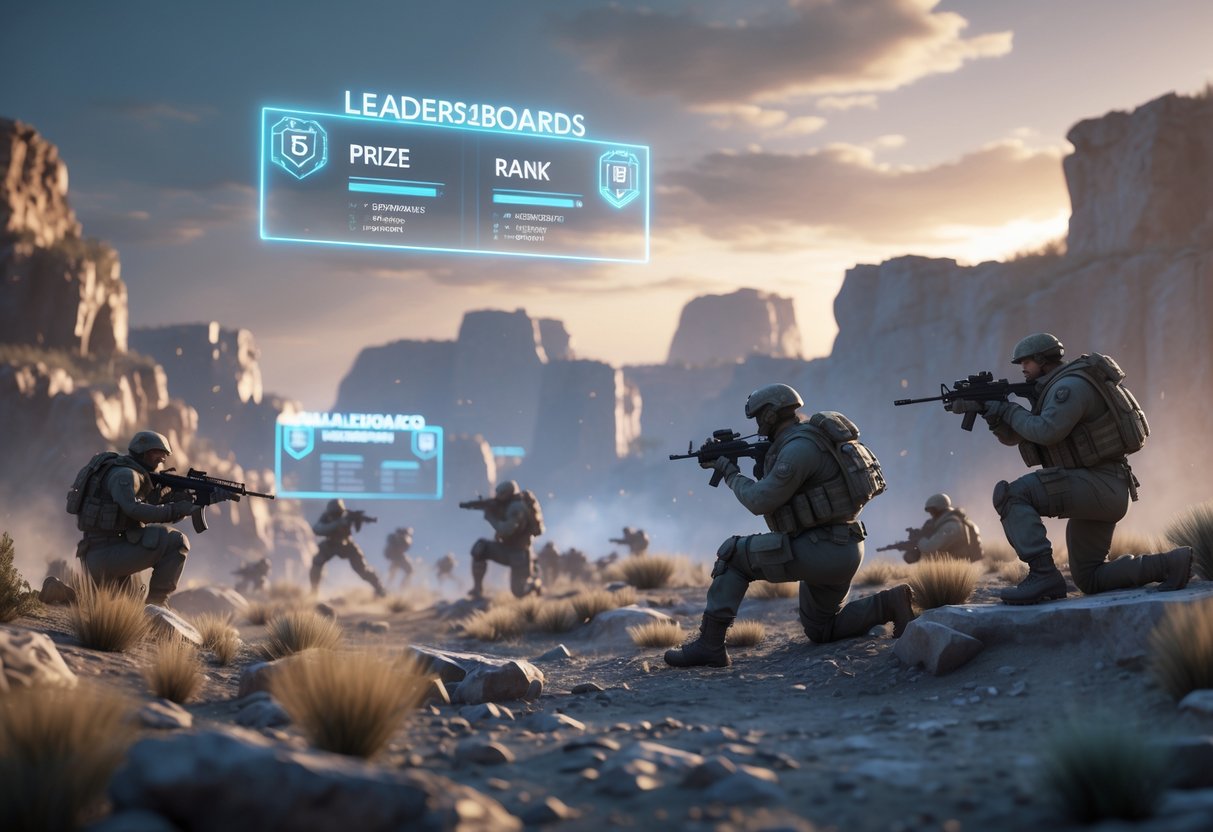
Delta Force hands out weapon skins, vehicle cosmetics, and exclusive items through its ranking system. Seasonal resets keep things fresh, so you can earn new rewards every few months.
The Battle Pass hooks into ranked progression, letting you maximize your haul each season.
Exclusive Weapon and Vehicle Skins
As you climb the ranks, your cosmetic rewards get more impressive. When you hit Lieutenant, you’ll snag the ASV-Dispute vehicle skin and some weapon experience coins.
Colonel rank brings the M700 Athletic Vibe weapon skin and Silver Eagle avatar. This is where Delta Force starts letting you show off your competitive achievements to other players.
Once you reach General, you unlock avatar options like the Anti-Vehicle Expert and Red Eagle designs. These cosmetics pop up on loading and death screens, so your opponents can see your skill level.
Reach the top General of the Army rank, and you’ll get the King of Eagles avatar. Only players who rack up 7,200+ Merit Points each season can claim this exclusive cosmetic.
| Rank Tier | Key Rewards |
|---|---|
| Lieutenant | ASV-Dispute vehicle skin |
| Colonel | M700 Athletic Vibe weapon skin, Silver Eagle avatar |
| General | Anti-Vehicle Expert avatar, Red Eagle avatar |
| General of the Army | King of Eagles avatar |
Battle Pass and Ranked Rewards
Battle Pass Merit Cards double your ranked progression speed. Just activate a 2x multiplier card before you queue up; it’ll last for one full match.
You’ll find Merit Cards in the Collections menu at the bottom of the main screen. Honestly, it’s smart to save these for matches where you’re feeling confident, especially during weekend events.
The Battle Pass doesn’t reset with your rank. You’ll keep your Battle Pass progress, unlocked weapons, and attachments even after seasonal resets.
Heads up: Merit Cards don’t stack. Only use one per match, or you’ll waste them.
If you’re in lower ranks—Private through Sergeant—you mostly get weapon experience coins. These help you level up your guns faster, but don’t expect any visual customisation at this stage.
Seasonal and Progress-Based Rewards
Every season, there’s a soft reset that drops your rank by 1-3 tiers. If you’re General, you’ll reset to Sergeant, and Colonels drop to Sergeant II.
End-of-season rewards depend on your highest rank. If you reach General or higher, you’ll get exclusive player card plates that show up during matches.
The seasonal system keeps things fresh by making sure nobody camps at high ranks forever. You’ll have to prove yourself again each season if you want to keep elite status.
Quick tip: Use Merit Cards when you’re about to hit milestones like Colonel or General for the best reward efficiency.
Your account level, weapon unlocks, and cosmetics stay with you permanently. Only your competitive placement resets, so you never lose gear or Battle Pass progress.
Delta Force Competitive Features
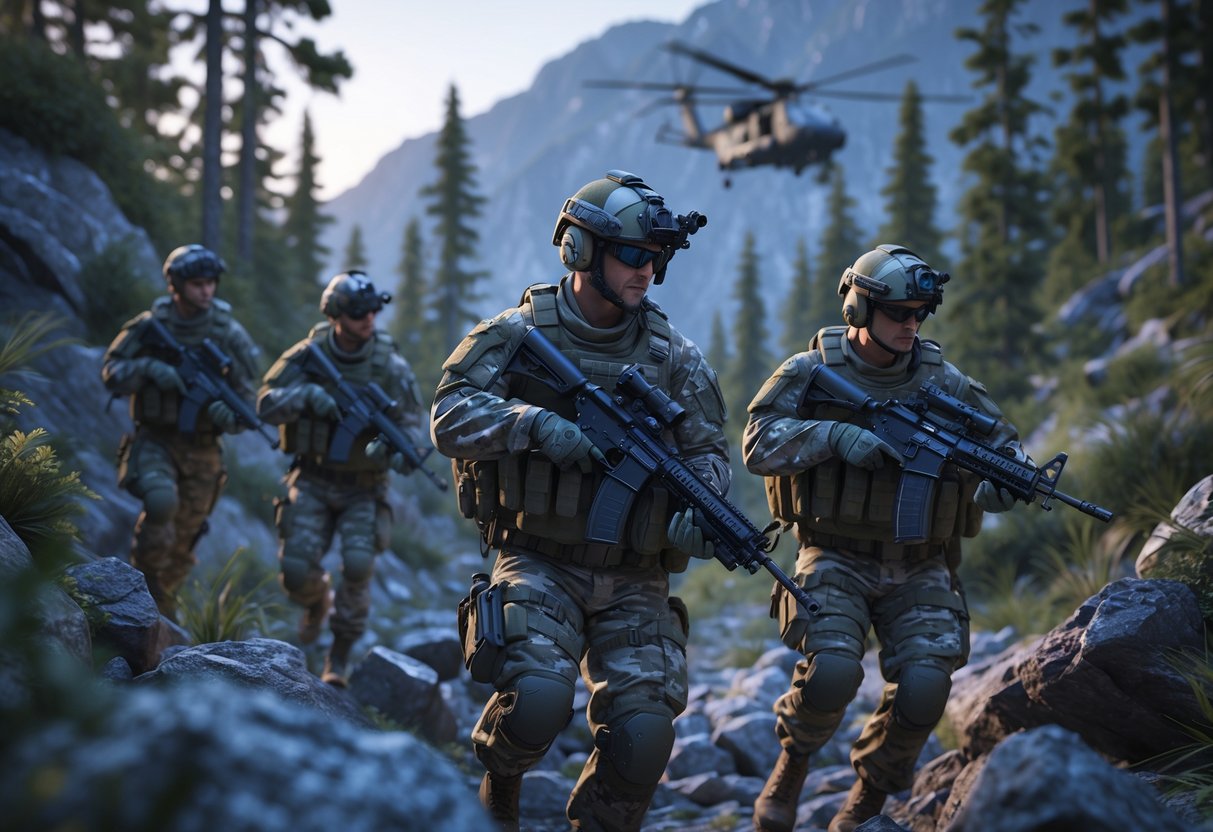
Delta Force ranked mode centers on Merit Points and structured progression, not just win-loss records. You’ll find detailed leaderboards, skill-based matchmaking, and seasonal rewards that recognize steady performance in both Operations and Warfare modes.
Leaderboard Mechanics
The Delta Force leaderboard tracks Merit Points as your main ranking metric. You earn points through match performance, completing objectives, and helping your team—not just from kills or wins.
Merit Point Structure:
- Operations Mode: Earn points for extraction success, reviving teammates, and finishing objectives.
- Warfare Mode: Get points for capturing, defending, and supporting your squad.
- Seasonal Reset: Rankings refresh every few months with placement matches.
Leaderboards split into regional and global views. You can track your progress against local players or go for the international top spots.
Rank Tiers Include:
- Bronze through Diamond divisions
- Multiple sub-ranks in each tier
- Special Elite tier for the best of the best
If you stop playing, your Merit Points slowly decay. This keeps leaderboards lively and prevents inactive players from hogging top spots forever.
Competitive Features Beyond Rank
Delta Force adds several systems beyond basic ranking. Skill-based matchmaking considers your recent performance, not just your current rank.
Key Competitive Systems:
- Fair Match Algorithm: Teams get balanced based on recent Merit Point gains.
- Mode-Specific Rankings: You’ll progress separately in Operations and Warfare.
- Performance Tracking: The game offers detailed stats to help you improve.
Each season starts with placement matches—ten games that set your starting rank and help matchmaking do its job.
Seasonal Features:
- Limited-time competitive events
- Ranked playlists with special rules
- Community challenges that can shake up the leaderboard
Delta Force also tracks stats like damage per minute, objective scores, and support actions. These numbers help you spot areas for improvement beyond just climbing the ranks.
Recognition of Top Players
Delta Force highlights top players in a bunch of ways. If you perform well, you’ll get seasonal rewards and exclusive cosmetics.
Recognition Systems:
- Seasonal Titles: Exclusive names show up next to your player tag.
- Elite Cosmetics: Unlock special weapon skins and character customisation by ranking up.
- Leaderboard Spotlights: Top regional players get featured profiles.
High-tier players unlock permanent rewards, like weapon attachments, character outfits, and victory poses. These stick around even after seasonal resets.
Every month, the game spotlights community highlights—crazy plays, clutch moments, and more from ranked matches. It’s a nice extra motivation to push higher.
Reward Categories:
- Performance-Based: Earned with consistent high-level play.
- Achievement-Based: Unlocked by completing tough competitive challenges.
- Time-Limited: Available only during certain seasons.
Delta Force is working on esports integration features too, though those are still in progress. The ranked system already supports tournaments with its structured ranks and skill assessments.
Tips for Sustaining Competitive Performance

If you want to succeed in Delta Force for the long haul, you’ll need to keep your performance steady and adapt to new gameplay changes. Let’s talk about keeping your score per minute (SPM) up while rolling with the game’s updates.
Maintaining High SPM
Your SPM directly affects how many Merit Points you earn and how fast you rank up. The best way to boost SPM is to focus on objectives, not just chasing kills.
Go after objective-based actions like capturing zones, planting bombs, or escorting vehicles. These usually net you more points than just eliminations.
Blowing up vehicles gives you a huge SPM boost. If you see an enemy helicopter or tank, take it out—one takedown can be worth several kills.
Merit cards give you temporary SPM multipliers. Use them when you’re playing well, not when you’re on a bad streak.
Don’t forget about assists and team support. Spotting enemies, dropping ammo, and healing teammates all help your SPM and support your squad.
Adapting to Meta Changes
Delta Force’s meta shifts with weapon balance updates and map rotations. Keep an eye on patch notes to spot buffed weapons or nerfed strategies.
Weapon meta changes come often. What’s strong now might not work next season. Stay flexible with your loadouts.
Map rotations can totally change what works. Some maps reward long-range fights, others are all about close-quarters. Adjust your playstyle to fit.
Watch pro player streams and tournaments to see how the best adapt. They’re usually quick to spot new trends.
Try out different operator abilities when updates drop. Sometimes a balance patch makes an old ability suddenly viable.
Consistency Across Seasons
Seasonal rank resets mean starting from lower tiers again. Warm up in casual matches before you jump into your first ranked games.
Stick to a regular practice schedule between seasons. Long breaks make it harder to get your groove back.
Track your stats from season to season. Look for patterns—what helps you climb, and what drags you down?
Team up with consistent squadmates. Playing with the same group builds trust and better communication.
Set realistic rank goals for the season. It’s better to aim for steady improvement than to try for huge leaps all at once.
Future Outlook for Delta Force Esports
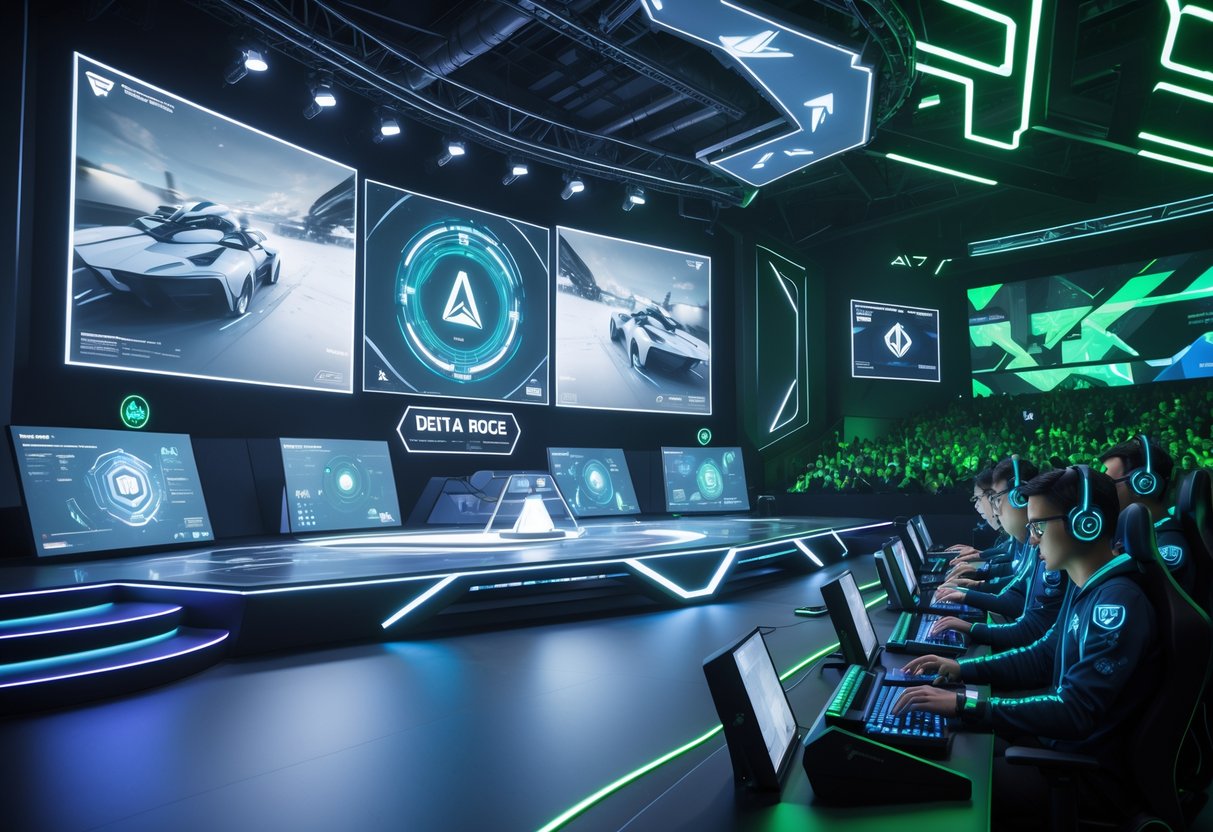
Delta Force is aiming to be a real contender in tactical shooter esports, with big tournaments and prize pools set for 2025. The game’s structured competitive play and multi-regional focus suggest it could grow fast in both pro and grassroots scenes.
Delta Force in the Esports Scene
Delta Force steps into a tactical shooter market packed with giants like Counter-Strike and Valorant. But its mobile-first approach gives it a unique edge in regions where mobile gaming dominates.
The World Championship 2025 in September is a big move for credibility. With six regions—Europe, North America, South America, China, Asia-Pacific, and Southeast Asia—the game’s going global right out of the gate.
Level Infinite’s backing gives the game financial stability for long-term esports growth. They already showed commitment with the Delta Force Global League Season 1 and its £36,000 prize pool, plus solid tournament infrastructure.
Mobile tactical shooters keep growing, and Delta Force’s mix of Warfare and Operation modes should appeal to a wide range of competitive players and viewers.
Potential for Organised Tournaments
Tournament infrastructure looks promising, with several formats already confirmed. The Global League Season 2 registration system shows Level Infinite knows how important easy qualification is.
Prize pools are pretty generous for a new game. The £400,000 Delta Force Invitational signals they’re serious about drawing top talent and big audiences.
Regional leagues will probably expand through 2025. Right now, there’s a focus on Europe and North America, but Asia-Pacific markets could be next, especially since mobile shooters are huge there.
Tournament formats use Phase 1 and Phase 2 qualifiers leading to finals. This multi-stage approach keeps audiences engaged over time, not just for one-off events.
The Global Operator Pick system and 6-game Mandelbrick-based scoring format hint at some unique competitive structures. Maybe that’ll help Delta Force stand out from the crowd.
Community-Driven Competitions
Grassroots tournaments already look strong, with easy online registration for teams in different modes and regions. That lowers the barrier for anyone wanting to compete.
Because it’s mobile, organisers don’t need fancy hardware. Local gaming cafes and community centers can run Delta Force tournaments without much hassle.
One thing to note: Community tournaments rely on plenty of active players. If the playerbase drops, it gets tough to keep events running.
Regional communities will probably develop their own metagames and strategies. The Asia-Pacific region especially benefits from existing mobile esports infrastructure.
University and college esports programs might jump in, too. Delta Force’s low hardware requirements make it perfect for school tournaments on a budget.
Frequently Asked Questions
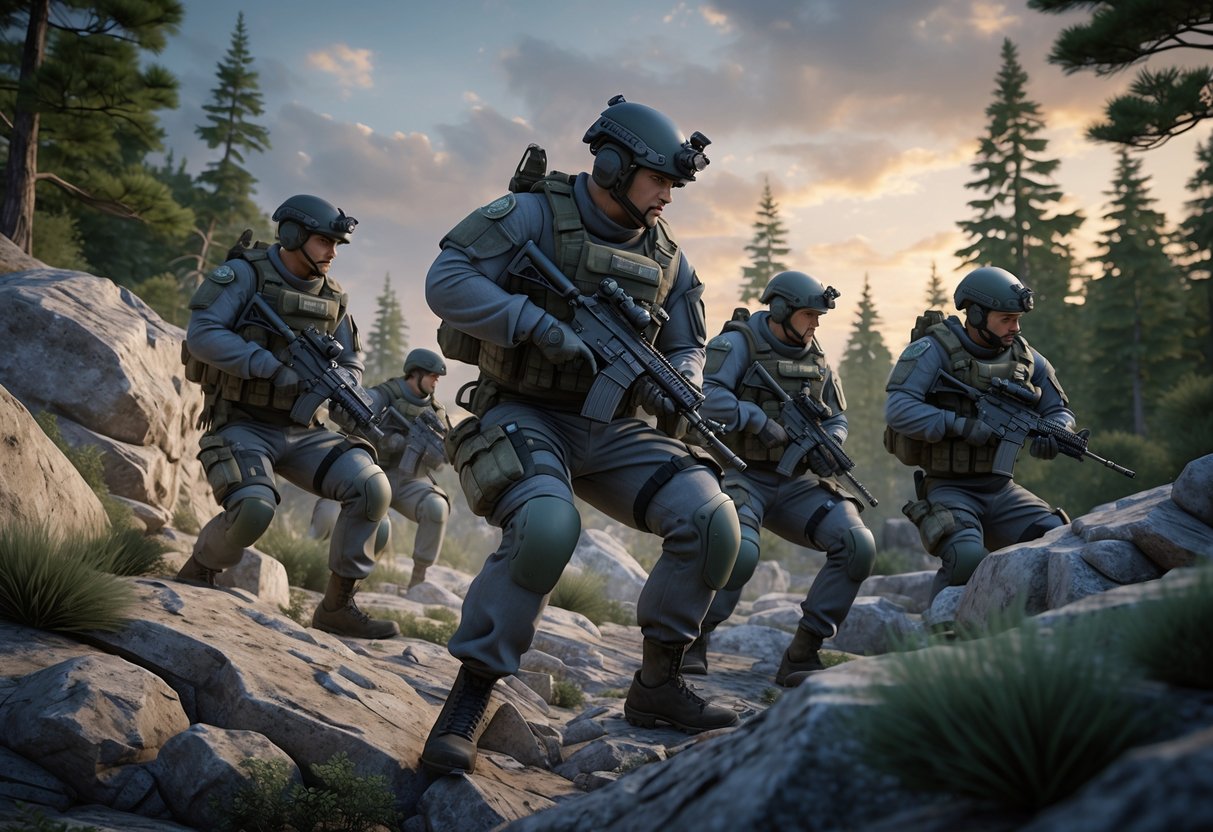
Players have a lot of questions about what it takes to compete at the top. To get there, you’ll need strategic thinking, good teamwork, mental resilience, and plenty of practice.
How can one improve their strategic skills to excel in Delta Force competitions?
Watch pro matches and tournament streams. Notice how top teams position themselves and coordinate attacks.
Practice map knowledge every day. Learn every angle, cover spot, and rotation route—knowing the map helps you make split-second decisions.
Team up with the same group to build team strategies. Solo queue won’t teach you coordinated play. Try joining Discord groups or competitive leagues.
Review your own gameplay recordings. Look for mistakes in positioning or timing. Most players repeat errors without noticing.
What are the essential qualities of a top-performing Delta Force competitor?
Communication matters more than pure aim. Clear, quick callouts help your team react before the enemy does.
Adaptability beats rigid strategies. Top players change their approach based on what opponents do—even in the same match.
Mental resilience sets great players apart. Stay calm after a bad round. Tilt just ruins your focus and team mood.
Game sense comes with experience. Knowing when to engage, rotate, or hold your ground takes hundreds of matches.
How does teamwork impact success in Delta Force tournaments?
Teams that coordinate well usually beat groups of solo stars. Five average players with good teamwork can outplay five talented individuals.
Trust lets you play aggressively. If you know your teammate will trade kills, you can take more risks.
Role specialisation helps a lot. Having dedicated support, entry fraggers, and leaders brings structure to your squad.
Regular practice builds chemistry. Teams that scrim together daily develop a sixth sense for each other’s moves—even without saying a word.
What are the best ways to keep up with the evolving tactics of Delta Force play?
Watch pro tournaments whenever you can. The meta shifts fast, and you’ll usually spot new strategies at the top level before they trickle down.
Jump into active communities on Reddit or Discord. Players there love sharing fresh tactics and counters—sometimes a little too enthusiastically, but you’ll pick up trends quickly.
Check out videos from coaches and analysts. They have a knack for breaking things down, so even the complicated stuff starts making sense.
Try out new tactics in ranked matches with your usual squad. Honestly, you can’t really simulate the real pressure of a match in practice mode.
Keep an eye on patch notes and dev updates. If you know about weapon tweaks early, you’ll adjust your playstyle before most people even notice.
Could you offer tips on maintaining focus and composure during high-stress Delta Force matches?
Build a pre-match routine that works for you. A simple warm-up gets your brain in the right place before the game starts.
Use breathing techniques between rounds. Taking a few deep breaths can slow your heart rate and clear your head.
Talk to yourself in a positive way. Instead of “I’m playing badly,” try “Next round, I’ll position better.” It sounds cheesy, but it actually helps.
Take a quick break during timeouts. Step away from your screen for a second, maybe stretch your shoulders, and let your mind reset.
Focus on what you can control—like crosshair placement and team comms. The score will sort itself out if you nail the basics.
What training routines do experienced Delta Force players recommend for newcomers aiming to compete professionally?
Try to set aside about 30 minutes every day for aim training. Kovaak’s and Aim Lab both work well for this—pick whichever feels less boring to you. If you stick with it daily, you’ll see more progress than if you cram for hours once in a while.
Give just as much time to working on game sense. Watch pro matches and jot down notes on how they position themselves. You’ll pick up a lot just by observing their choices.
Make sure to schedule regular scrims with teams around your own skill level. Real teamwork grows out of structured practice, not just random pugs.
Each week, pick a specific skill to improve. Maybe focus on entry fragging one week, then switch to support utility the next.
Once a month, record your matches and actually watch them back. Compare your positioning and decisions to what you did before. It’s a solid way to see if you’re getting better or just spinning your wheels.

